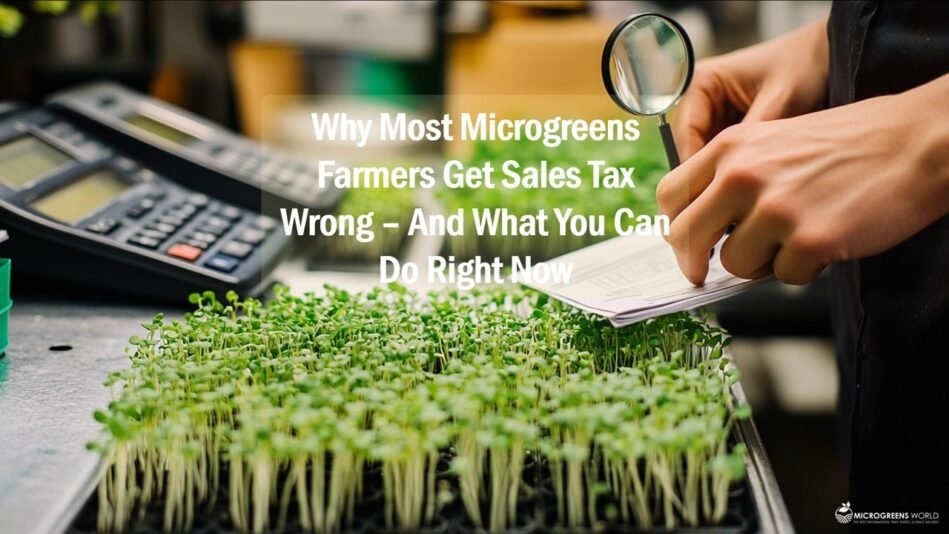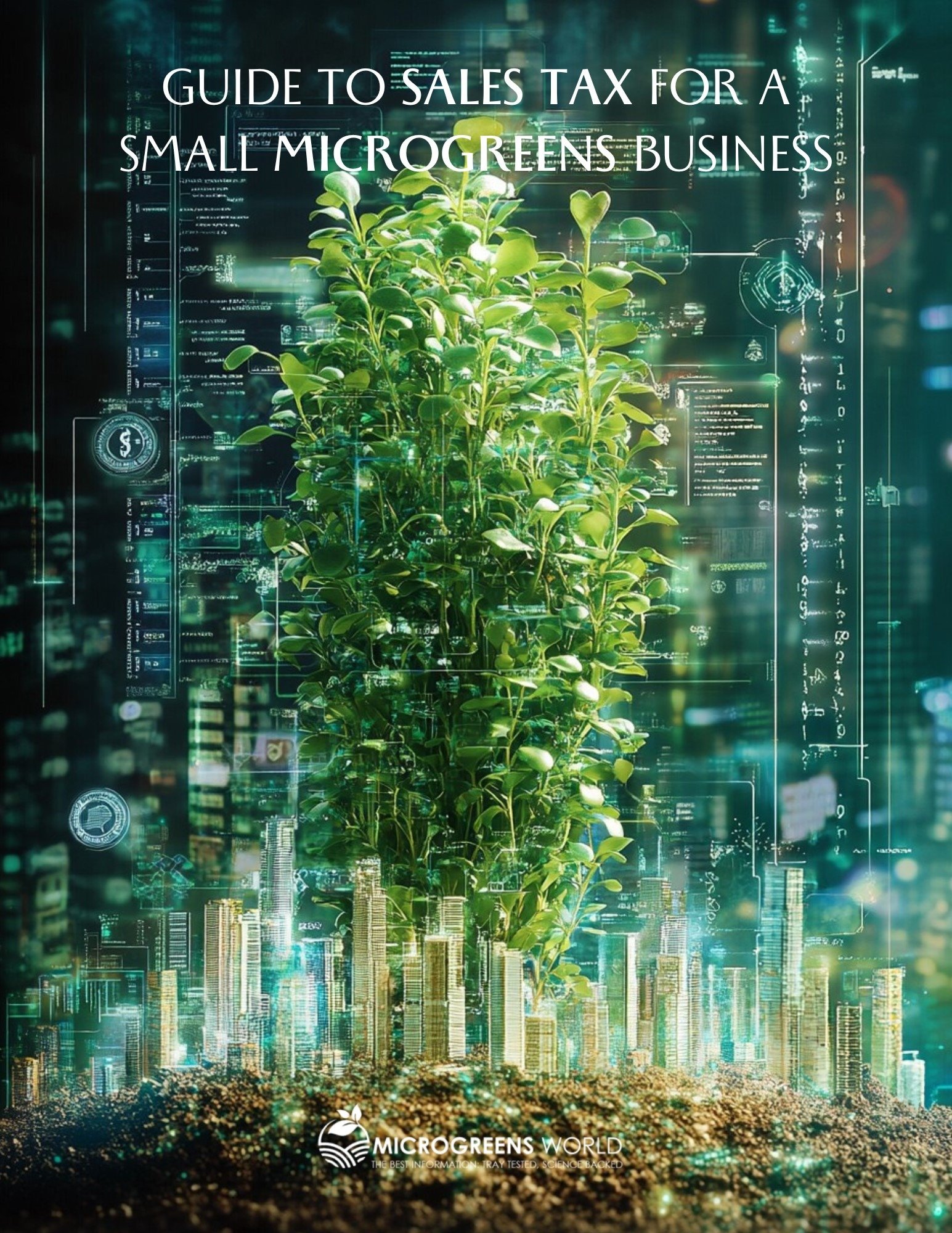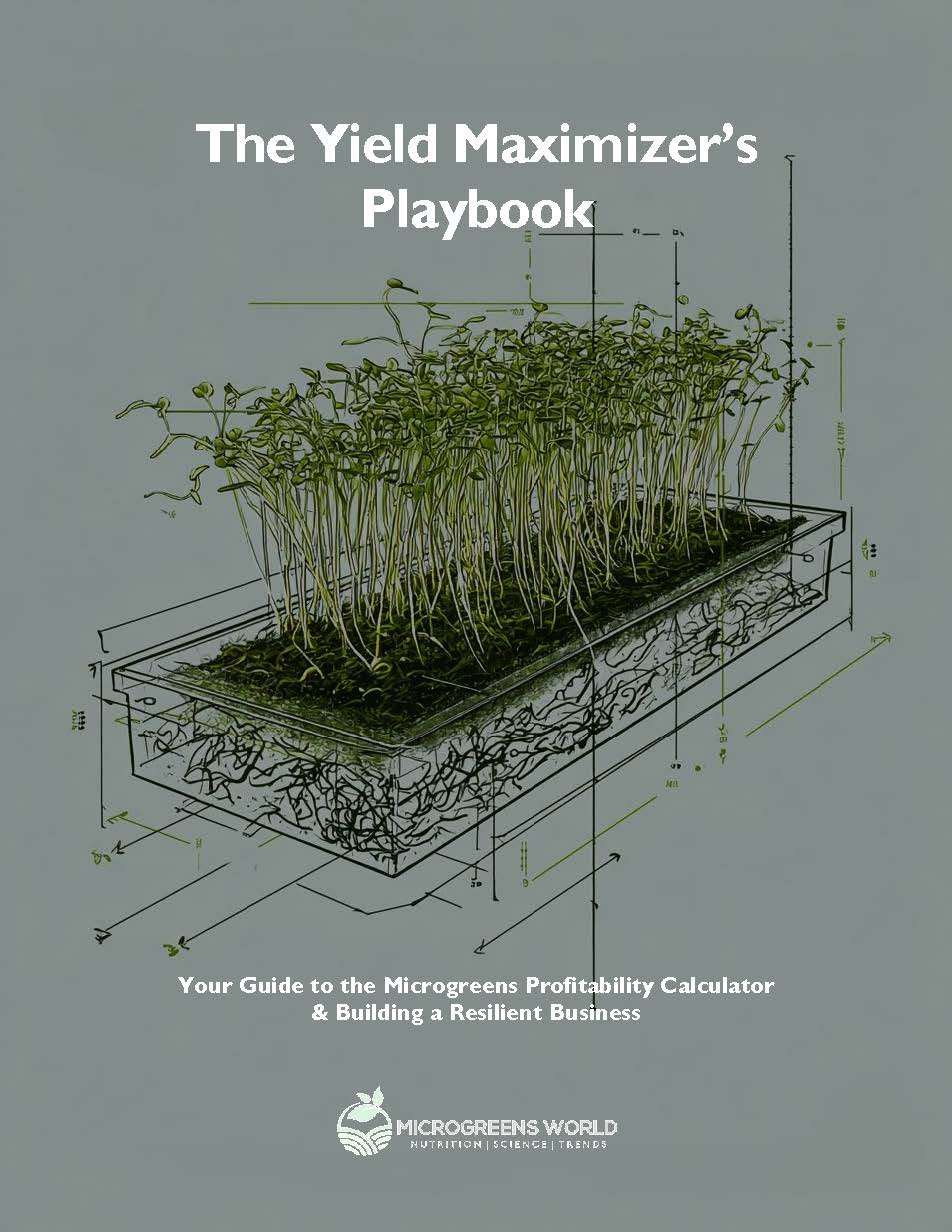Back on May 1, 2024, I got an email from Mason Bond of Third Day Greens in Peachtree City, just outside of Atlanta, GA.
He was on his way to drop off some samples to a couple of restaurants to try and win their business. He had a question about pricing. So, I called him, and we had a long conversation. Turns out Mason was just starting his journey.
Well, four months later, almost to the day (it’s September 4), Mason called me to say he was on his way to closing a deal with his second customer.
This time, he had a question about sales tax, whether he should charge the restaurant’s sales tax or just consumers, or whether sales tax was even necessary.
I didn’t give a good answer, but this is a crucial business item for small microgreens businesses.
Many microgreens farmers overlook sales tax, risking costly penalties and audits. You’re likely making common mistakes: misclassifying products, misunderstanding B2B vs. B2C tax implications, or ignoring online sales complexities.
This oversight can lead to financial strain, reputation damage, and lost growth opportunities. To protect your business, act now: research your state’s specific requirements, implement a robust tracking system, and consult a tax professional.
Proper sales tax management isn’t just about compliance—it’s a strategic advantage that improves your operations, builds trust, and positions you for sustainable growth.
Don’t let tax issues hold you back; there’s a simple solution to transform this challenge into an opportunity.
As a certified business coach, I wanted to give you a more qualified answer.
Key Takeaways
- Many microgreens farmers lack awareness of sales tax implications, leading to costly mistakes and non-compliance.
- Misclassification of microgreens and misunderstanding of B2B vs. B2C tax differences cause common errors.
- Online sales introduce complex tax issues like Nexus laws, which farmers often oversimplify or overcomplicate.
- Ignoring sales tax obligations can result in penalties, back taxes, and damage to a business’s reputation.
- Immediate action is needed as states tighten online sales tax regulations, increasing the risk of audits.
Introducing: The Guide to Sales Tax for A Small Microgreens Business
Common Frustrations
The Solution
The Invisible Problem – Why Sales Tax Matters More Than You Think
The “Invisible” Issue
The Impact on Your Business
Sales tax on Microgreens
Common Mistakes Microgreens Farmers Make with Sales Tax
Mistake 1: Misclassifying Microgreens
Mistake 2: Not Understanding B2B vs. B2C Sales
Mistake 3: Overcomplicating or Oversimplifying Online Sales
Your Roadmap to Avoid These Pitfalls
What Happens When You Get It Right
Clear Compliance, Less Stress
Maximizing Profitability
Smooth B2B and B2C Operations
The Guide Every Microgreens Farmer Needs
Introducing the Ultimate Resource for Microgreens Farmers
What’s Inside
Not Just a Manual, But a Lifeline
Immediate Benefits
Created with Seasoned Experts
How Ignoring Sales Tax Costs You More Than Money
The Emotional Cost
The Business Cost
The Reputation Risk
Why the Urgency?
Sales Tax as a Growth Opportunity
Call to Action
Take Action Now: Purchase a Copy
A Small Investment for Massive Peace of Mind
Buy the Guide Today!
Wrap-Up: Microgreens and Sales Tax
Summary
Take Control of Your Business and Avoid Costly Mistakes
Take the Guesswork Out of Sales Tax on Microgreens
Nearly half of all microgreen farmers are leaving money on the table, and they don’t even realize it. The culprit? Sales tax on microgreens.
Many growers underestimate the complexity of microgreens sales tax regulations, leading to costly mistakes. Whether you’re just starting your microgreens business or you’re a seasoned seller, understanding and properly paying microgreens sales tax is essential.
Don’t let confusion about sales tax eat into your profits.
Common Frustrations
Many microgreens farmers find themselves caught in a web of sales tax confusion.
You’re not alone if you’re unsure about sales tax on microgreens when selling to restaurants, at farmer’s markets, or online.
The fear of audits looms large, paralyzing decision-making.
Meanwhile, you’re missing opportunities to optimize your microgreen selling price and boost sales.
This confusion can lead to pricing errors, potentially leaving money on the table or risking non-compliance.
This comprehensive resource demystifies complex sales tax laws, offering step-by-step instructions tailored to microgreens farmers.
You’ll learn how to accurately calculate, collect, and remit sales tax, minimizing audit risks and maximizing profits.
With this guide, you’ll transform tax challenges into opportunities for business growth and financial stability.

You’ve likely overlooked sales tax on microgreens. But it’s far more than a minor nuisance—it’s a critical business factor that can make or break your operation.
Ignoring or mishandling this “invisible” issue can lead to unexpected tax liabilities and severe penalties, potentially crippling your small microgreens farm.
The “Invisible” Issue
In the early stages of your microgreens business, it’s easy to overlook the seemingly minor issue of sales tax.
You’re focused on growing, marketing, and selling your product. Sales tax feels like an afterthought—invisible until it’s not.
This oversight may result in grave repercussions. As your business grows, so does your tax liability.
Suddenly, you’re facing audits, penalties, and a mountain of paperwork you weren’t prepared for.
The Impact on Your Business
Ignoring sales tax can devastate your microgreens business.
You’ll face unexpected tax liabilities, hefty penalties, and potential audits. These financial burdens can cripple your cash flow and operations.
Furthermore, you’ll waste valuable time and resources rectifying past mistakes.
Worst-case scenario? Legal consequences that could shutter your business.
Don’t gamble with your livelihood—address sales tax proactively to guarantee long-term success.
Sales tax on Microgreens
Four words can make or break your microgreens business: sales tax on microgreens.
It’s not just paperwork—it’s a vital factor affecting your bottom line. Ignoring it can lead to hefty penalties and lost profits.
Controlling sales tax compliance gives you a competitive edge, guarantees financial stability, and demonstrates professionalism.
Don’t underestimate its impact; it’s as essential as growing quality produce. Accept it as a key business strategy.
You’re likely making costly mistakes with your microgreens sales tax without even realizing it.
From misclassifying your produce to mishandling online sales, these errors can lead to severe financial and legal consequences.
Understanding the nuances of B2B versus B2C sales and steering through the complex landscape of state-specific tax laws is essential for your business’s compliance and success.
Mistake 1: Misclassifying Microgreens
Among the most common pitfalls for microgreens farmers, misclassifying their produce tops the list.
You might assume microgreens are always tax-exempt as groceries, but that’s a costly mistake. State laws vary wildly, and some treat microgreens as specialty items or even decorative products.
Don’t fall into this trap. Research your state’s specific regulations and consult a tax professional to guarantee compliance and avoid penalties.
Mistake 2: Not Understanding B2B vs. B2C Sales
Another common blunder microgreens farmers make is failing to distinguish between B2B and B2C sales tax requirements.
You’re likely selling to both consumers and businesses, but tax rules differ. B2B sales often qualify for resale exemptions, while B2C sales typically require tax collection.
Mishandling this distinction can lead to costly errors, audits, and penalties.
Don’t assume all your sales are taxed uniformly—scrutinize each transaction’s nature.
Mistake 3: Overcomplicating or Oversimplifying Online Sales
With the rise of e-commerce, microgreens farmers often stumble when managing online sales tax complexities.
Nexus laws and marketplace facilitator rules can bewilder even seasoned entrepreneurs. You might oversimplify, ignore out-of-state obligations, or overcomplicate by trying to comply with every state’s regulations.
Neither approach serves you well. Instead, focus on understanding your specific situation, identifying where you have nexus, and leveraging technology to streamline compliance.
Your Roadmap to Avoid These Pitfalls
Steering through the sales tax landscape doesn’t have to be a minefield for microgreens farmers.
Your roadmap to success is the “Guide to Sales Tax for A Small Microgreens Business.” This comprehensive resource tackles the complexities of local, state, and online sales, helping you sidestep common pitfalls.
It’s your key to excelling in sales tax compliance, ensuring you’re not leaving money on the table or risking costly audits.
You’ll breathe easier when you nail your microgreens sales tax obligations.
Getting it right means clarity in your operations, protection from costly audits, and the freedom to focus on growing your business.
You’ll reveal hidden profits, sidestep financial landmines, and seamlessly sell to both businesses and consumers with confidence.
Clear Compliance, Less Stress
Peace of mind is the ultimate reward for microgreens farmers who get their sales tax right.
You’ll sleep easier knowing you’re compliant, avoiding costly audits and penalties. With clear records and proper collection, you’re protected from unexpected tax bills.
This clarity allows you to focus on what matters: growing your business and delighting customers.
Correct sales tax handling isn’t just legal—it’s a competitive advantage.
Maximizing Profitability
How can mastering sales tax on microgreens improve your bottom line?
By understanding your tax obligations, you’ll avoid costly penalties and interest.
You’ll also identify potential exemptions and savings opportunities.
Accurate pricing that includes proper tax calculations guarantees you’re not eating into profits unknowingly.
This information equips you to make well-informed decisions regarding pricing, expansion, and market strategies, ultimately boosting your profitability and competitive edge.
Smooth B2B and B2C Operations
Perfecting sales tax on microgreens isn’t just about avoiding pitfalls—it’s about revealing smoother operations across your entire business.
You’ll navigate B2B and B2C sales with confidence, eliminating friction in transactions. Restaurants and grocery stores will appreciate your tax savvy while direct-to-consumer sales become hassle-free.
Your expertise in sales tax transforms you from a mere supplier into a trusted partner, opening doors to new opportunities and sustainable growth.
You’re about to uncover the ultimate resource for microgreens farmers: “Guide to Sales Tax for A Small Microgreens Business.”
This comprehensive manual covers everything from state-specific regulations to online sales tax collection, helping you navigate the complex world of sales tax with ease.
Written by industry experts, it’s your lifeline to compliance and profitability, offering immediate solutions to streamline your operations and avoid costly mistakes.
Introducing the Ultimate Resource for Microgreens Farmers
Steering through the complexities of sales tax can be daunting for microgreens farmers.
That’s why we’ve created the “Guide to Sales Tax for A Small Microgreens Business.” This comprehensive resource demystifies tax regulations, ensuring you’re compliant while maximizing profits.
What’s Inside
Within the pages of our comprehensive guide, you’ll find a wealth of essential information for microgreens farmers traversing the complex world of sales tax.
Explore state-specific regulations, tackle online sales tax intricacies, and attain proficiency in the nuances of B2B versus B2C tax collection.
You’ll also uncover innovative record-keeping strategies to streamline your operations.
This guide empowers you to navigate sales tax confidently, ensuring compliance and optimizing your business’s financial health.
Not Just a Manual, But a Lifeline
A sturdy lifeline in turbulent waters – that’s what our comprehensive sales tax guide represents for microgreens farmers. It’s not just a manual; it’s your shield against costly mistakes and operational chaos.
You’ll gain clarity on complex tax issues, streamline your processes, and safeguard your business.
Don’t fumble through regulations alone. Arm yourself with expert knowledge and convert tax obligations from a hindrance into a competitive edge.
Immediate Benefits
Time is money, and our guide saves you both. You’ll gain instant access to clear, actionable steps for sales tax compliance. No more sifting through confusing regulations or risking costly errors.
Within minutes, you’ll understand your obligations and how to meet them efficiently. This guide eliminates guesswork, reduces stress, and empowers you to focus on what matters most: growing your microgreens business with confidence.
You’ll learn how to navigate state-specific rules, handle online sales, and implement efficient record-keeping systems. Don’t let tax confusion stunt your growth—master it with our guide.
Created with Seasoned Experts
Our guide’s credibility stems from its creators: seasoned experts who’ve walked in your shoes. They’ve navigated the complexities of sales tax while running successful microgreens operations. Unlike generic advice, this guide offers tailored solutions for your unique challenges.
You’ll get insider knowledge on industry-specific exemptions, common pitfalls, and proven strategies.
Trust in real-world expertise to enhance your tax compliance game and protect your business.
Ignoring sales tax on your microgreens business can cost you more than just money.
You’ll face constant stress and anxiety, wondering if you’ll be audited or fined while potentially racking up hefty penalties and interest.
Even a minor tax issue can tarnish your reputation with customers and partners, jeopardizing the business you’ve worked so hard to build.
The Emotional Cost
Beyond the financial implications, ignoring sales tax obligations can exact a hefty emotional toll on microgreens farmers.
You’ll constantly wrestle with anxiety, wondering if you’re one audit away from disaster. This nagging uncertainty can erode your confidence and focus, hampering business growth.
The mental burden of non-compliance can be overwhelming, leading to stress-induced health issues and strained relationships.
Don’t let tax worries overshadow your passion for farming.
The Business Cost
Three major financial pitfalls await microgreens farmers who neglect their sales tax obligations.
First, you’ll face hefty penalties for non-compliance, often a percentage of unpaid taxes.
Second, interest accrues on overdue amounts, compounding your debt.
Finally, you’re liable for back taxes, potentially stretching years into the past.
These costs can quickly escalate, dwarfing what you’d have paid if you’d managed your sales tax correctly from the start.
The Reputation Risk
While financial penalties hit your wallet hard, tax issues can deliver an equally devastating blow to your reputation.
Customers may question your integrity and professionalism if they find out you’ve mishandled taxes. Partners might hesitate to collaborate, fearing guilt by association.
Even minor infractions can snowball into major PR nightmares, eroding the trust and credibility you’ve worked hard to build.
In today’s interconnected world, word spreads fast, potentially costing you valuable relationships and future opportunities.
You’re standing at a crossroads in your microgreens business, and the path you choose now will shape your future success.
As states crack down on sales tax collection, especially for online sales, waiting to address this issue could lead to costly penalties and missed growth opportunities.
Why the Urgency?
Now is the time to take action on sales tax compliance for your microgreens business. States are rapidly tightening regulations, especially for online sales. Ignoring or delaying will only compound your problems. You’ll face increased scrutiny, potential audits, and hefty penalties. Don’t risk your business’s future.
As e-commerce grows, tax authorities are becoming more vigilant. Act now to protect your enterprise and guarantee long-term success.
Sales Tax as a Growth Opportunity
Considering the changing tax landscape, addressing sales tax compliance isn’t just a necessary evil—it’s a golden opportunity to improve your microgreens business.
By tackling this challenge head-on, you’re positioning yourself as a professional, law-abiding entrepreneur. You’ll achieve confidence, foster customer loyalty, and establish a robust platform for expansion.
Seize this chance to streamline your operations and scale your business confidently, free from tax-related roadblocks.
Act Now: Sales Tax Compliance Crucial
Urgency surrounds the need for microgreens farmers to address sales tax compliance. Don’t wait for an audit to spur action. Start by researching your state’s specific requirements. Then, implement a robust tracking system for sales and taxes.
Consider consulting a tax professional to guarantee you’re on the right path.
Take Action Now: Purchase a Copy
Equipped with knowledge about the importance of sales tax compliance, you’re ready to take the next essential step.
Don’t delay in securing your “Guide to Sales Tax for A Small Microgreens Business.” This all-encompassing guide will enable you to adeptly maneuver through intricate sales tax laws with assurance.
Act now to protect your business, avoid costly penalties, and gain a competitive edge. Your success in the microgreens industry depends on perfecting these vital financial aspects. Invest in your business’s future today. This small purchase will yield massive returns in peace of mind and financial stability.
Act now and take control of your microgreens sales tax obligations.
You’ve seen how complex sales tax can be for microgreens farmers, but you don’t have to navigate this maze alone. By understanding the rules and getting expert guidance, you’re taking control of your business’s financial future.
Get our comprehensive guide now to eliminate the guesswork and guarantee you’re handling sales tax correctly for your microgreens operation.
Summary
Throughout this article, we’ve examined the complex world of sales tax for microgreens farmers. You’ve learned that many growers make costly mistakes, but it doesn’t have to be this way.
By understanding your state’s regulations, correctly classifying your products, and implementing robust recordkeeping systems, you can navigate sales tax confidently. Don’t let confusion or misinformation hold you back.
Take control of your tax obligations and protect your business’s future.
Take Control of Your Business and Avoid Costly Mistakes
Equipped with insights from this resource, you’ve gained an advantage in overseeing your microgreens venture’s sales tax responsibilities. You’ve gained essential insights that many farmers overlook, positioning you to avoid costly errors and potential legal issues.
By implementing these strategies, you’re taking control of your finances and ensuring compliance. This proactive approach sets you apart, fostering long-term success and peace of mind in your microgreens venture.
Take the Guesswork Out of Sales Tax on Microgreens
Don’t let sales tax confusion hold your microgreens business back any longer. Grab our comprehensive guide now and take control of your tax obligations. You’ll gain clarity on complex regulations, avoid costly mistakes, and streamline your operations.
Act today to secure your business’s future and focus on what matters most: growing exceptional microgreens. Don’t wait—download the guide and transform your approach to sales tax immediately.
Remember, it’s not just about following rules—it’s about protecting your passion and livelihood. Act today. Your future self will thank you.
A Small Investment for Massive Peace of Mind
Investing in the “Guide to Sales Tax for A Small Microgreens Business” is a smart move that’ll pay dividends far beyond its modest price tag. It’s a small investment that’ll bring you massive peace of mind and clarity in running your business.
You’ll gain confidence in your tax compliance, avoid costly penalties, and free up mental energy to focus on growing your microgreens empire.
Don’t let tax uncertainty hold you back any longer.
Buy the Guide Today!
The time to act is now.
Don’t let sales tax confusion hold you back any longer. Our comprehensive guide is your ticket to clarity and confidence. Select the “Buy Now” button below for immediate entry to professional knowledge that’ll save you time, stress, and money.
Research
Agrawal, David R. “The Internet as a Tax Haven?” American Economic Journal: Economic Policy, vol. 13, no. 4, November 11 Nov. 2021, pp. 1–35, https://doi.org/10.1257/pol.20170094.
Figueroa, E., & Legendre, J. (2020). States That Still Impose Sales Taxes on Groceries Should Consider Reducing or Eliminating Them. https://www.cbpp.org/sites/default/files/atoms/files/3-16-06sfp3.pdf
Submitter, University of Illinois Institute of Government & Public Affairs and Powers, Elizabeth T., Should Illinois Eliminate the State Grocery Tax? (April 11, 2024). Institute of Government and Public Affairs Policy Spotlight, April 2024, http://dx.doi.org/10.2139/ssrn.4832273
ORCID. (2024). Orcid.org. https://orcid.org/0000-0003-1032-6429
Sales Taxes on Soda, Candy, and Other Groceries, 2018. (n.d.). https://files.taxfoundation.org/20180706104150/Tax-Foundation-FF598-Groceries-Soda-Candy.pdf
Sanders, C., 2023. This is the moment: It’s time for Alabama to untax groceries, Alabama Arise. United States of America. Retrieved from https://coilink.org/20.500.12592/7rbqjf. COI: 20.500.12592/7rbqjf.
Shy, Oz, Is Sales Tax Included in the Price? Consumer Inattention and Price Competition (May 31, 2024). http://dx.doi.org/10.2139/ssrn.4794108
Viard, Alan D., Should Groceries be Exempt from Sales Tax? (July 25, 2011). State Tax Notes, Vol. 61, No. 4, 2011, Available at SSRN: https://ssrn.com/abstract=2218546
Wang, L., & Zheng, Y. (2024). Why are grocery foods taxed in the United States? Theory and spatial evidence from multilevel government interactions. Regional Science and Urban Economics, 104, 103959. https://doi.org/10.1016/j.regsciurbeco.2023.103959
Zhao, Jason and Barrett, Christopher B. and Kaiser, Harry M. and Zheng, Yuqing, The Incidence of Grocery Taxes in U.S. Food and Factor Markets (July 01, 2024). http://dx.doi.org/10.2139/ssrn.4899140















